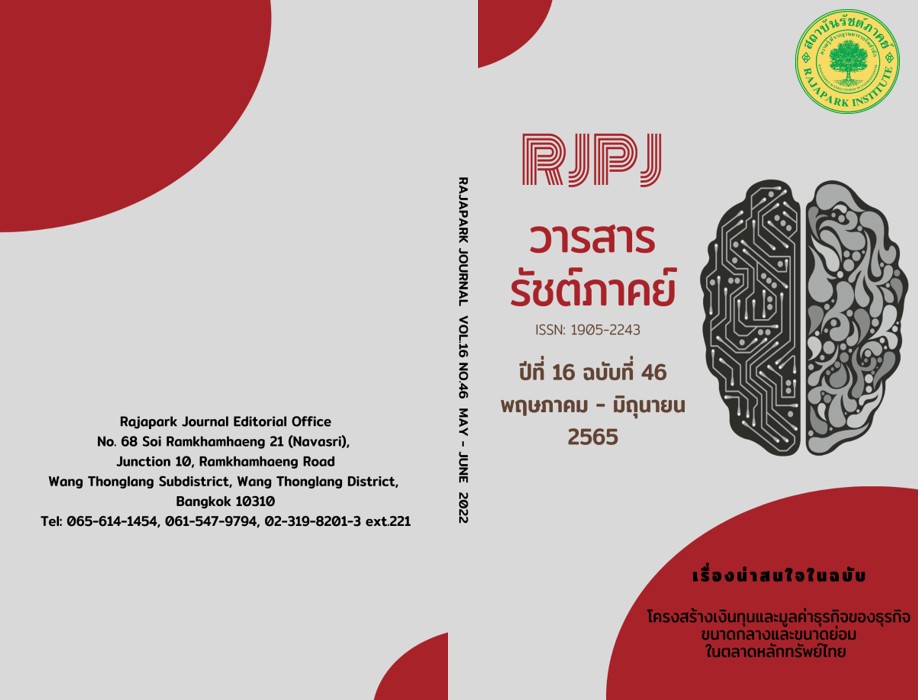The Development of Online Learning Model to Improve Competency in Business Competition for Online Sellers
Main Article Content
Abstract
The article aimed to study 1) the level of business competitiveness, 2) to study the knowledge necessary to develop competency in business, and 3) to study the online learning model to develop the competency in business competition for online sellers. This research was quantitative. The samples consisted of 1,200 online sellers who have been selling online products for less than 3 years by purposive sampling. The research instruments were 2 questionnaires. The statistics were mean, standard deviation, Pearson's correlation coefficient, exploratory component analysis, analysis of structural equation models, and corroborative component analysis. The results showed that the overall level of business competitiveness of online sellers was at a high level. All 105 pairs of variables were observed with a positive correlation. The knowledge needed to develop the business competitiveness of online sellers found that the overall level was at a high level. The knowledge needed to develop the business competitiveness of online sellers consists of 3 components: Model A, B, and C which consisted of the empirical data at a very good level.
Article Details

This work is licensed under a Creative Commons Attribution-NonCommercial-NoDerivatives 4.0 International License.
Views and opinions appearing in the Journal it is the responsibility of the author of the article, and does not constitute the view and responsibility of the editorial team.
References
Alessi, S. M., & Trollip, S. R. (2001). Multimedia for Learning: Methods and Development (3rd ed.). Allyn & Bacon.
Bank of Thailand. (2021). The Impact of E-commerce Businesses on Local Operators. https://www.bot.or.th.
Chuekeaw, T. (2007). Customers Buying Behavior Towards Products and Services on Electronic Commerce in Chiangmai Province[Independent Study, Chiang Mai University].
Electronic Transactions Development Agency. (2020). Value of e-Commerce Survey in Thailand 2019. https://www.etda.or.th.
Inthong, A., & Prakthayanon, S. (2021). Development of Online Marketing Communication Strategies to Influence Customers’ Intention to Order Sacred Objects for Worship in Thailand. Siam Academic Review, 22(1), 23-32.
Khan, B. H. (2005). Managing E-learning: Design, Delivery, Implementation and Evaluation. Information Science Publishing.
Lertjeerajarat, J. (2005). Factors Affecting Purchasing Behavior of Goods and Services via e-Commerce of Undergraduate Students in Chiang Mai Province[Master’ Thesis, Chiang Mai University]. https://search.lib.cmu.ac.th/search/?searchtype=.&searcharg=b1357813
National Economic Reform Steering Committee. (2016). Report of the Commission on Economic Reform Driving. National Reform Steering Council on Creative Economy and Cultural Reform. National Reform Steering Assembly.
Office of the Civil Service Commission. (2020). What is Digital Literacy?. http://km.prd.go.th/iot-platform.
Oliver, R. (1999). Whence consumer loyalty?. The Journal of Marketing, 63, 33-44. https://doi.org/10.2307/1252099
Pakdeewanich, C., & Tumrongsuk, S. (2021). A Study of Inventory Replenishment Policy for Online Marketing Business: A Case Study of Bedding, Furniture, and Home Appliances. Rajapark Journal, 15(42), 413-427.
Phochanachan, S., Uppapong, K., Atchavanan, C., Mangkang, K., & Kanwivat, S. (2020). The Characteristics of Social Entrepreneurs in Thailand. Journal of Humanities and Social Sciences, Rajapruk University, 6(3), 31-43.
Rodniyom, A. (2021). Educational Technology and Online Teaching and Learning Management in the New Era. Journal of Social Science and Buddhistic Anthropology, 6(9), 123-133.
Theppitak, T. (2021). New Normal or New Normal Lifestyle After Emerging Disease COVID-19: Online Business, Retail Business and Restaurant Business, and the Changing Direction of Transportation and Logistics Industry in Thailand. Princess of Naradhiwas University Journal of Humanities and Social Sciences, 8(1), 246-274.


